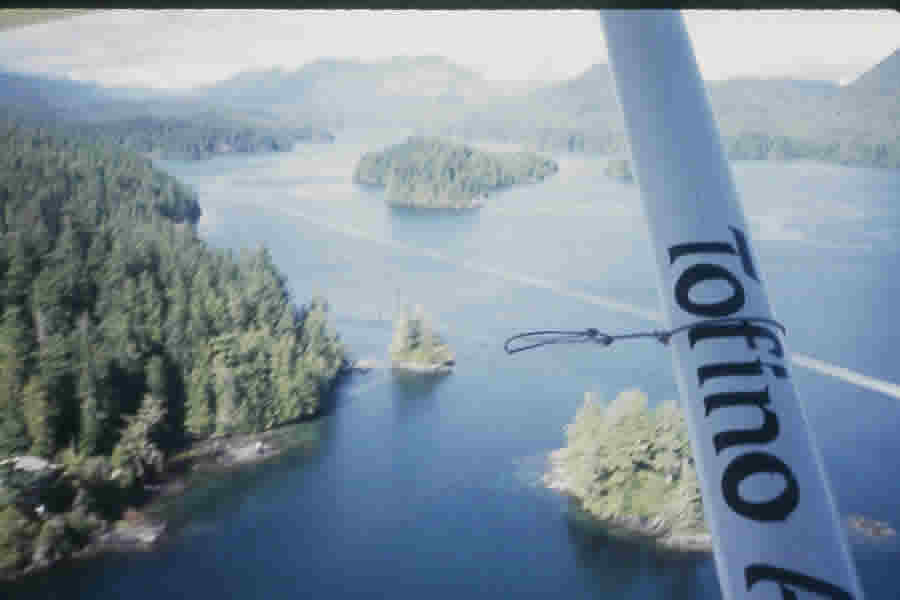
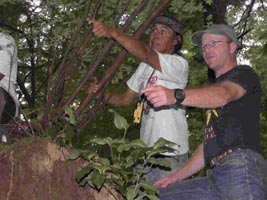
Clayoquot Sound / Faculty (Steven & Dennis) discussing culturally modified trees
Field Biology and Field Geology of the Canadian Temperate Rainforest (Clayoquot Sound Biosphere Reserve), British Columbia , Canada.
"The Environmental Learning Institute program that I participated in on Clayoquot
Sound, BC has been invaluable. The staff is a remarkable combination of
brilliance, experience, scientific knowledge, and cultural understanding.
To be immersed in this unique environment has enriched my professional
and personal life. Already I have developed and presented two workshops
using inquiry and environmental themes from this workshop. The Hesquiaht
First Nations perspectives and a western science grounding are combined
in a setting that is absolutely breathtaking. This is an international
learning and service experience not to be missed."
Jean Carpenter
Outreach Coordinator, Center for Life Sciences, Colorado State University
"As an Associate Professor of Education at St. Cloud State University, I found the BC Environmental Learning Institute program invaluable to myself as a "teacher of teachers," and feel teachers, educators and serious post-secondary learners at all levels would benefit through participating in similar experiences. Of particular value to teachers is the manner in which Inquiry Teaching and Learning are emphasized. This emphasis stems from the readings and preparation for the course, but more strongly through the hands-on experiences. For example, our team participated in a conservation biology research project in collaboration with our First Nations hosts. This project helped solidify the Inquiry approach to teaching and provided a valuable cultural link between our group and our First Nations host family.
Other activities of interest included: learning about how First Nations people utilized their natural resources in a sustainable way, observing the myriad wildlife living close to our camp (wolves, bears, whales & salmon), working with Hesquiaht and Anglo Canadian scientists and educators to learn more about local salmon stream integrity and the inter-tidal ecosystem, and hiking and climbing through the various bio-geological zones of Olympic Peninsula in Washington and the Clayoquot Sound Biosphere Reserve in Canada.
I found the workshop extremely helpful. In my 30 years of teaching and numerous research opportunities it was absolutely the best, most valuable, experience I’ve ever had and the benefit to my students is priceless."
- Professor Gregory Coverdale, St. Cloud State University
Required Personal Clothing and Gear
National Science Teaching Standards
To Pay Program Fee by Credit Card
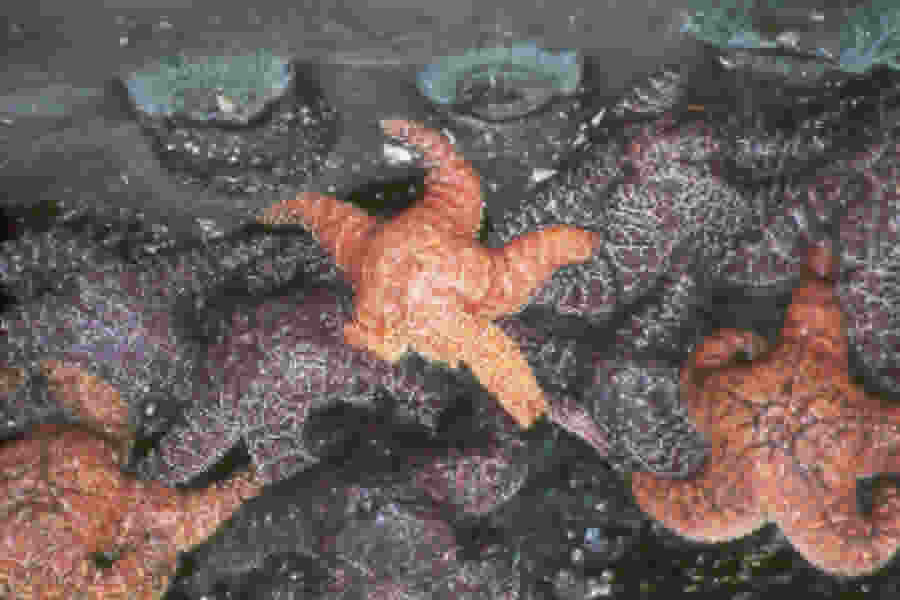
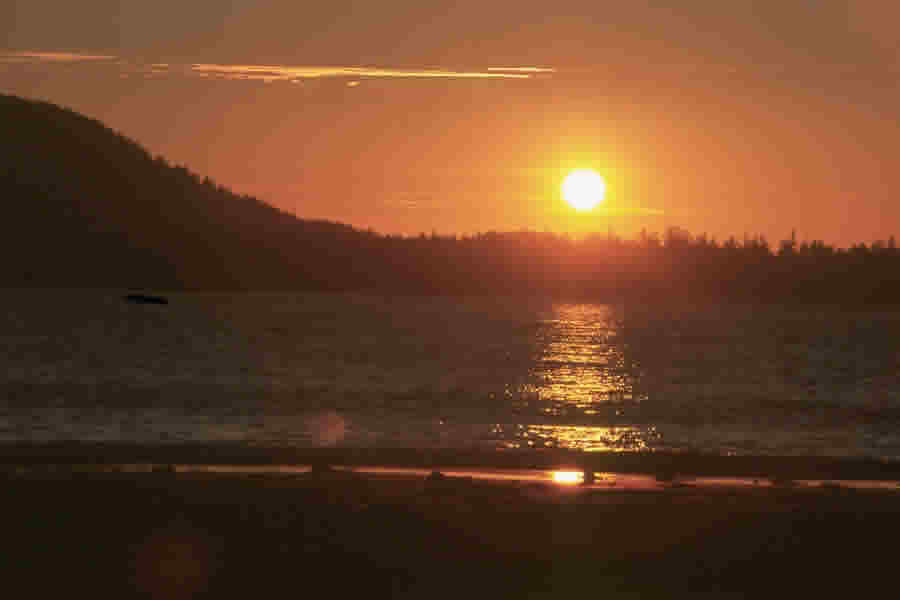
Pisasters / Out the Longhouse Door
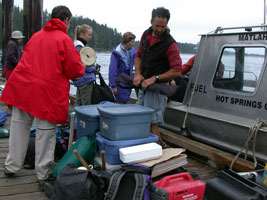
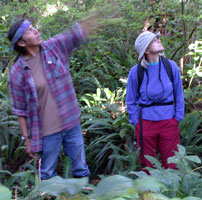
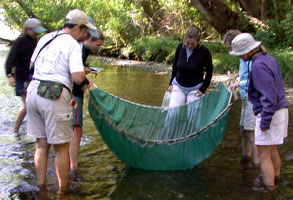
Team loading the water taxi / Traditional knowledge lesson in the rainforest / Assessing salmon streams
Our 2007 workshops in British Columbia, Canadaand Ladakh, India offer field science students and intermediate-secondary science educators opportunities to learn more about inquiry-based science education philosophy, pedagogy and praxis and global environmental change while learning about a threatened ecosystems of global significance. Each program has a dual tract structure in biology/geology and sustainable development studies allowing the participant to specialize in their discipline of interest. Applied geology and biology faculty supervise all courses. We invite applications from appropriate natural and physical science undergrad majors, pre-service & in-service teachers, education and environment undergraduate & graduate student, science education professors (teacher of teachers) and science education professionals (e.g. park, museum and outdoor center affiliated). The workshops are possible due to the support of the Environmental Learning Institute (www.environmentallearning.org), Woodrow Wilson National Fellowship Foundation (www.woodrow.org/teachers), and the Colorado School of Mines Teacher Enhancement Program. We can arrange for you to talk with previous participants.
August 1-8 , 2007
Deadlines: Rolling Admissions. If space is available participants may be admitted up to the course date so long as all required forms, including medical form and release form, are received prior to the rendezvous.
Participant Share of Cost: A comprehensive course fee of $1200. $150 non-refundable deposit. Payment may be made by credit card (using PayPal) or check made out to Environmental Learning Institute.
The Environmental Learning Institute provides course transport from the Victoria rendezvous to the Clayoquot Sound Biosphere Reserve, Canada, on-course travel, food, cooking equipment, lodging, protected area fees, course reader and all scientific and research equipment.
†This fee does not include airfare from the participantís home to and from Victoria, personal clothing, personal equipment expenses, personal expenses or optional travel.
PLEASE LET US KNOW IF YOU WOULD LIKE TO COMMUNICATE WITH PREVIOUS PARTICIPANTS!
Rendezvous: 1 PM, August 1, Victoria, British Columbia Provincial Museum. Please have your lunch before the rendezvous.
Dropoff: Noon, August 8, Victoria, BC. Therefore you can book flights from Victoria or ferries to Seattle for the next morning.
Credits:
Option 1. 2.5 graduate-level relicensure hour credits available through Colorado School of Mines (additional roughly $150). Registration for this credit is done before the course with payment by credit card or check.
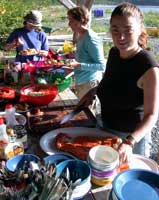
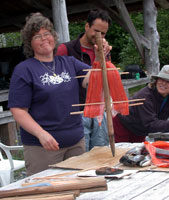
David / Sarah / Karen
1. Facilitator Contact Information:
David Scott Silverberg, Ph.D.,
520 245-3711, silverberg@alum.mit.edu
Environmental Learning Institute
Steven and Karen Charleson, Hooksum Outdoor School, Hesquiaht Harbor, B.C.
Dennis Morgan, M.Sc., Director, Bamfield Community Forest
Sarah Tyne, M.Sc., Instructor, Bamfield Marine Station
2. Brief Description:
The Clayoquot Sound Biosphere Reserve is composed of the largest intact virgin rainforest in southern British Columbia, inland seaways, fiords and an incredibly rich marine environment. In this TORCH we will explore through authentic inquiry-based learning-research activities the incredible temperate rain forests of British Columbia's Vancouver Island's West Coast. Towering cedar trees, several salmon species, wolves, bears, eagles, resident grey and orca whales typify the region. We will live with the Hesquiaht First Nations and Anglo-Canadian communities whose lives are fundamentally dependent on the sustainable management of the region's still intact watershed. After a camping study tour from Seattle to Clayoquot Sound, we take a 2 hour boat ride to Hesquiaht Harbor. Our home base will be at a Hesquiaht First Nations traditional Longhouse. The group will study coastal temperate rainforest ecosystems in the west coast of Vancouver Island, Canada through hands-on explorations guided by local area experts. (Dr. Silverberg co-founded and directed the Boston University Affiliated School for Field Studies in Bamfield, B.C.) The program will take place in a 8-day session in August of 2007.
Teachers will:
- Study and work with our host family, the Charlesens of the Hesquiaht First Nations, and begin an understanding of Hesquiaht inquiry processes and traditional ecological knowledge.
- Learn about the climate, flora, fauna, and geology of coastal temperate rainforest ecosystems.
- Become familiar with global and local threats to these ecosystems.
- Learn the Grinnel system of field journaling.
- Learn a variety of field research techniques that can be applied in the classroom as well as in the field with their students.
- Experience inquiry-based learning first-hand and develop inquiry-based lessons for their own classrooms.
- co-design and co-implement a Participatory Action Research project (with geological and biological components) serving the interests of the local community.
- Be encouraged to establish long-term professional connections with each other and local experts.
- Participate in professional forums on inquiry-based science, alternative assessment, and constructivist pedagogy in the science classroom.
- Contribute to the creation of a world wide web site that will illustrate the philosophy, pedagogy and experiences of the workshop.
3. Itinerary:
The 8-day institute will be spent traveling to and from and staying in the Clayoquot Sound Biosphere Reserve, Vancouver Island, British Columbia, Canada. The group will meet in Victoria, BC and then take a study tour enroute to the Clayoquot Sound Biosphere Reserve.
1 August 2007 1 PM, Victoria Provincial Mueseum, drive
to Tofino, arrive late afternoon
2-7, August Hesquiaht Harbor, Clayoquot Sound Biosphere Reserve
8 August drive to Victoria
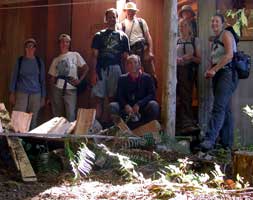
2003 BC TORCH Team
4. Levels of educator-participants:
ELI structures this program to be intergenerational and inter-academic level. The greatest goods develop from seriously committed learners from undergraduates to practising professionals. We invite pre-service, in-service, undergrad and graduate student, education professors (teacher of teachers) and education professionals (e.g. science education coordinators, university, park, museum and outdoor center affiliated). Those students taking the program for credit will be required to complete an individually-designed comprehensive final exam.
5. Structure of workshop:
We meet in Victoria, Vancouver Island B.C., then drive into the Clayoquat Sound
Biosphere Reserve. For those eight days, participants will attend content
lectures and guided hikes, undertake field studies in both coastal and
forest ecosystems. Our days are filled with field work, our evenings include
powerpoints, lively text-based discussions of inquiry-based learning, expeditionary
learning, team development models, global environmental change.
6. Content Knowledge Topics: Field Geology and Field Biology in the Context of Natural Ecosystems and Ecological Concepts
This course provides an overview of the British Columbia coastal rainforest ecosystems: what they are; how they work from a geological and biological perspective; and how they evolve and adapt to change. Ecosystem structure and function, as well as ecosystem development and dynamic equilibrium are integrated into a central theme of sustainability from a local and global perspective. Particular emphasis will be given to the ecology of British Columbia's Vancouver island coast , the Clayoquat Sound Biosphere Reserve. Biosphere, lithosphere, atmosphere interactions and exchanges within the coastal zone and temperate biomes are introduced as related to issues of local and global environmental change. The philosophy, pedagogy and learning activities of the course employ a standards- and inquiry-based approach.
Learning Activity Topics Include:
Environmental History of Canada
Hesquiaht, Nuu-chah-nulth Culture
Traditional Ecological Knowledge and Processes of Inquiry
Canada and Global Environmental Change
Experimental Design and Data Interpretation
Watersheds and Coastal Environmental Change
Tectonic, Geologic and Physical Geographic Development of British Columbia and Vancouver Island, Canada
Glacial Geomorphic Processes
Coastal Geologic Processes
Tides and Currents
Physical Oceanography of the Coastal Zone
Biogeochemical Cycles in the Coastal Zone
Causes and Consequences of Biodiversity
Temperate Rainforest Structure & Function
Habitat Fragmentation and Degradation
How Coastal Temperate Rainforests Work
Canada's Protected Areas and Communities
7. Curriculum materials:
Each participant will also receive a binder in which to put all course
handouts. Included will be readings on global change and current environmental
issues in temperate forest and coastal ecosystems, both global and local.
Maps and field guides for each field site as well as descriptions of common
field techniques and their applications will also be included. In addition,
teachers will receive handouts regarding pedagogy, ways in which inquiry
based learning may be implemented in the classroom, alternative assessment
(rubrics, portfolios, exhibitions), and constructivism in science education.
8. Field Equipment: Our field lab includes several notebook computers, and standard geological and biological field equipment. A digital projector, compasses, barometers, digital cameras, mini-DV camcorders, 35 mm SLR, dissecting microscope, GPS units.
9. Food and Lodging: We will be cooking in a camp and also occassionally eating in simple local restaurants. Participants will be asked to help the camp manager with cooking and cleaning chores in rotation. In Clayoquot Sound we will be living in a traditional longhouse. Enroute, we will be camping in tents and using sleeping bags. You need to bring your own sleeping bag and sleeping pad. Two person tents are provided, though you are welcome to bring your own if you prefer.
10. Physical Fitness Requirements: The British Columbia Rainforest TORCH course involves hiking in the wet temperate rainforest, dayhiking with a 20 pound daypack, hiking on trails and off-trails, traveling in a van for several hours on sometimes curvy coastal and mountain roads, †traveling in a motorboat on a choppy water surface.† Participants will sleep in tents, in sleeping bags with sleeping pads on the ground.†